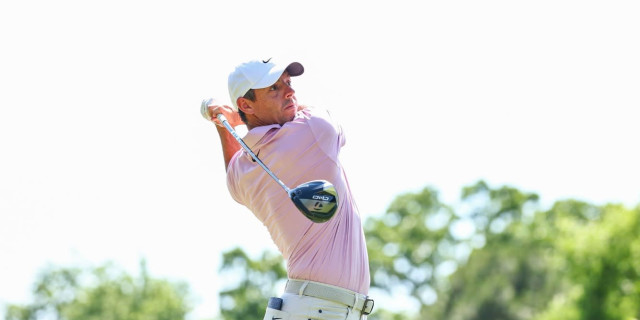
Rory McIlroy is Becoming The Modern Day Greg Norman
"I’m getting closer," Rory McIlroy said after his agonising runner-up finish to Wyndham Clark in the US Open 12 months ago. "The more I keep putting myself in these positions, sooner or later it’s going to happen for me. When I do finally win this next major, it’s going to be really, really sweet. I would go through 100 Sundays like this to get my hands on another major championship."
One year on, he may question whether he does have the stomach for more experiences like his latest near-miss, which must be the most painful yet. No one is fallible to golfing scar tissue during their lives playing this game, especially when competing at the highest and harshest levels, but the wounds from Pinehurst will surely cut deep and leave a permanent mark.
Two summers ago, McIlroy left St Andrews in tears of regret after seeing a legacy-making opportunity to win The 150th Open slip from his grasp, but his crushed expression and subsequent rapid departure from North Carolina was that of a man who felt the weight of all those imagined 100 bitter Sundays on his shoulders.
Rory's Major Agony

Much has been made about the growing burden hanging over the Northern Irishman as he nears a full decade since his most recent triumph in the events that matter the most. The 35-year-old has won Ryder Cups, Players Championships, World Golf Championships, multiple FedEx Cups and Race to Dubais, but when it comes to these four specific weeks that define the historic resonance of a golfer, he has fallen short for too long.
Ahead of this championship, he commented: "Obviously getting my hands on a fifth major has taken quite a while, but I'm more confident than ever that I'm right there, that I'm as close as I've ever been."
He wasn't wrong, either, as this was the closest he had been to silencing those outside critics and internal doubts that can humble any sportsperson, but contemplating what had happened during the flight back home to Florida, his next major victory must now feel further away than it ever has.
Those missed short putts on the 16th and 18th will be engraved within his mind, as will the club selection on both the par 3 15th and the inexplicable choice of driver on the last. Golf, major championships, and venues like Pinehurst are determined by the smallest of margins.
What makes it seem especially cruel this time is that McIlroy looked set to answer those questions that many had about him. He overcame the setback on the par 5 fifth - when his second shot ran off the green, missed the bunker, and rested against the clumpy, ragged grass that others had the luck to avoid. Brushing that aside, he made crucial par saves on the front nine, his putter was sharp, just as it was when he reeled off four birdies in five holes to take control.
But control is a tenuous thing on a stage like this - especially when the man you were a decade ago is now a stranger. He was not a father, a husband, or someone who had lived through all those painful Sundays from Georgia to Fife and California.
Reacting afterwards, Paul McGinley, analysing for the Golf Channel, said: "Mentally, he got on the precipice of winning this tournament and instead of driving over the line, he hesitated. And if you hesitate with guys like Bryson [DeChambeau] around you, who plays with fearlessness, you have a problem."
Defeat is not something new to McIlroy - or any professional golfer - it's part of this sport. The greatest players in history lost more than they won. Jack Nicklaus claimed 18 major championship titles, but he also finished runner-up 19 times.
McIlroy has displayed resilience before. He wouldn't have consistently sat at the summit of the game for 15 years and outlasted almost everyone else if he didn't possess that characteristic. We can remember his broken demeanour around the turn at Augusta National in 2011 when his Masters challenge evaporated - but he came back two months later and ran away with the US Open at Congressional.
Look what happened to Adam Scott at Royal Lytham & St Annes in 2012, when he bogeyed the last four holes to hand the title to Ernie Els. That was one of the most devastating losses we've seen in living memory, but the Australian responded the following spring by placing his arms inside the Green Jacket.
Either of these scenarios could be the fate of McIlroy. Perhaps he - like Els who had gone a decade without a major title - will ultimately benefit from another's misfortune, or he could yet excavate deeply to unearth the positives from Pinehurst and return with even greater resolve and emulate what Scott accomplished. But there are only so many scars you can receive before they start to show.
The Parallels With Greg Norman
It's not a comparison that McIlroy will appreciate, given his publicly declared views of the LIV Golf frontman, but the direction of his career has striking parallels with that of Greg Norman.
The Australian was a generational player, who, like McIlroy, was imperious with a driver in his hands. He played with a stubbornness and hubris that both created his biggest successes and contributed to his harshest defeats. He possessed undoubted charisma on the course and was unafraid to speak his mind. He won around the world, routinely claimed money lists and was world number one for an incredible 331 weeks - far beyond any of his contemporaries. Doesn't that remind you of someone?
But when it came to the majors, Norman was behind the likes of Nick Price, Seve Ballesteros, Payne Stewart, and especially Nick Faldo, who was the face resting on the other side of the coin. Norman may have been the man to beat week-to-week, he would have regularly snapped up those FedEx Cups if they were a thing back then, but when it came to the most revered prizes, it was the Englishman who dominated.
Recognising the status of the major championships, it's Norman's shortcomings in them that - harshly - are a headline of what was a brilliant playing career.
1986 was the year when he led all four majors after three rounds, winning just one at Turnberry, but instead of that we often think of Jack's famous rally and the holed bunker shot of Bob Tway in the PGA Championship.
Likewise, others will recall Larry Mize's holed pitch on the 11th to win the playoff over Norman at Augusta, or the Queenslander's disastrous finish on the 18th hole at Troon in extra holes with Wayne Grady and eventual-winner Mark Calcavecchia.
Norman also bogeyed the last to miss out on the Faldo-Scott Hoch playoff in the 1989 Masters, while he lost a playoff to Paul Azinger in the 1993 PGA Championship, but that defeat was placated as weeks earlier the Aussie had played one of the great major rounds to deny Faldo at Royal St George's, Norman's crowning triumph.
Later, there was a lost 54-hole lead in the 1995 US Open at Shinnecock, before we all know what happened down Magnolia Lane in 1996 against his nemesis Faldo.
Speaking to the press afterwards, Norman reflected on that fateful day that exemplified the contrasting tales of these two men, "I screwed up. It’s all on me. I know that," he said after seeing a six-shot lead transform into a five-shot defeat. "But losing this Masters is not the end of the world. I let this one get away but I still have a pretty good life. I’ll wake up tomorrow, still breathing, I hope. All these hiccups I have, they must be for a reason. All this is just a test. I just don’t know what the test is yet."
People sometimes forget that he came back for more in 1999 when he was tied for the lead with Jose Maria Olazabal with five holes to play, having just eagled the iconic 13th. But he backed that up with bogeys on the 14th and 15th as the Basque legend won his second Masters.
And then there was 2008, when Norman remarkably defied his 53 years and lack of competitive play to lead the Open after three rounds, only to finally yield to the breeze of Royal Birkdale and the five-wood of Padraig Harrington.
Sometimes, Norman lost to a piece of magic, but many of these wounds were self-inflicted, and usually, it was a combination of the two that McIlroy can likely emphasise with in his case, whether it be a cold putter on the Old Course as Cam Smith seemingly holed everything, or the genius of DeChambeau's bunker shot on the last at Pinehurst to a make a gritty par that McIlroy himself wasn't able to convert under the pressure.
How McIlroy responds in the immediate future will be fascinating, starting with Royal Troon before that long wait for the Masters. But like Greg Norman all those years ago, he might be left wondering what the meaning is behind these spiteful tests and wicked lessons that he's continually being forced to overcome.

Be part of the action with a selection of unique golf tournament experiences, from playing in a pro-am with the stars to watching the action at golf’s most illustrious events. Whether it’s the Masters or The Open, The Ryder Cup or WM Phoenix Open, build your own bespoke package with the experts at Golfbreaks.com.
What do you think? post your thoughts and feedback on the Golfshake comments: jump to comments here.
Tags: us open The US Open rory mcilroy daily picks









